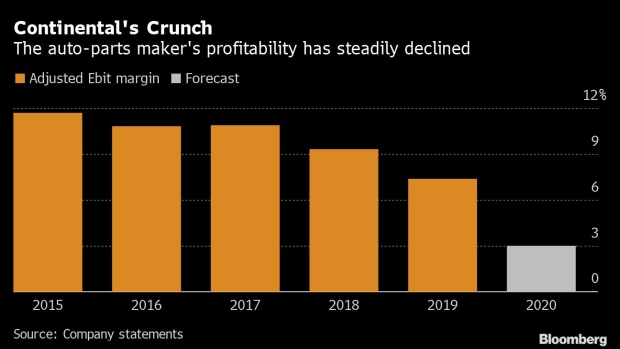Mar 9, 2021
Continental Sees Muted Profitability on Chip Shortage, Pandemic
, Bloomberg News

(Bloomberg) -- Continental AG said profitability will be held back this year by an industrywide shortage of semiconductors and economic fallout from the pandemic.
Europe’s second-biggest car-parts maker expects a margin of 5% to 6% on adjusted earnings before interest and tax this year, the German manufacturer said Tuesday in a statement. That compares with analysts’ average estimate of 6.3%.
Global passenger car output may rebound between 9% and 12%, Continental said.
The supplier has been hard hit by the dramatic industry slump last year as it accelerates a plan to cut or transfer some 30,000 jobs. A steady decline in returns culminated in the abrupt departure late last year of Chief Executive Officer Elmar Degenhart. Since then, a severe shortage of semiconductors has disrupted manufacturing plans across the industry.
The supply chain constraints from the chip shortage will lead to additional expenses of about 200 million euros ($237 million), the company said.
Degenhart’s successor Nikolai Setzer, 49, has the urgent task to reverse an erosion in profits gripping the company over the past five years. Continental is seeking to roughly triple profitability to 8% to 11% margin in the medium term.
Setzer pledged in December to sharpen the group’s focus on growth areas and future technologies as the auto industry adds electric models and software-based functions, potentially leading to acquisitions or divestments of legacy operations. Continental is exploring a sale of its turbocharger unit, Bloomberg reported in October.
Continental swung to a 718 million-euro operating loss last year, while the adjusted result more than halved to 1.3 billion euros. The adjusted Ebit margin slumped to 3.5%, Continental said.
Continental has catching up to do. Suppliers including Aptiv Plc, Denso Corp. and Valeo SA “are best positioned to master the transition” while the EV shift will boost overall demand for powertrain components from suppliers, UBS Group AG analysts said in a report last week. Parts makers like Continental might benefit as well but have more work to do to adjust their legacy combustion business, UBS said.
The Hanover-based company plans to spin off its powertrain unit Vitesco Technologies in the second half of the year. After changing course a number of times, Continental needs to show it’s able to make deep changes and separate the operations that span EV and combustion-powertrain components as well as sensors.
©2021 Bloomberg L.P.





